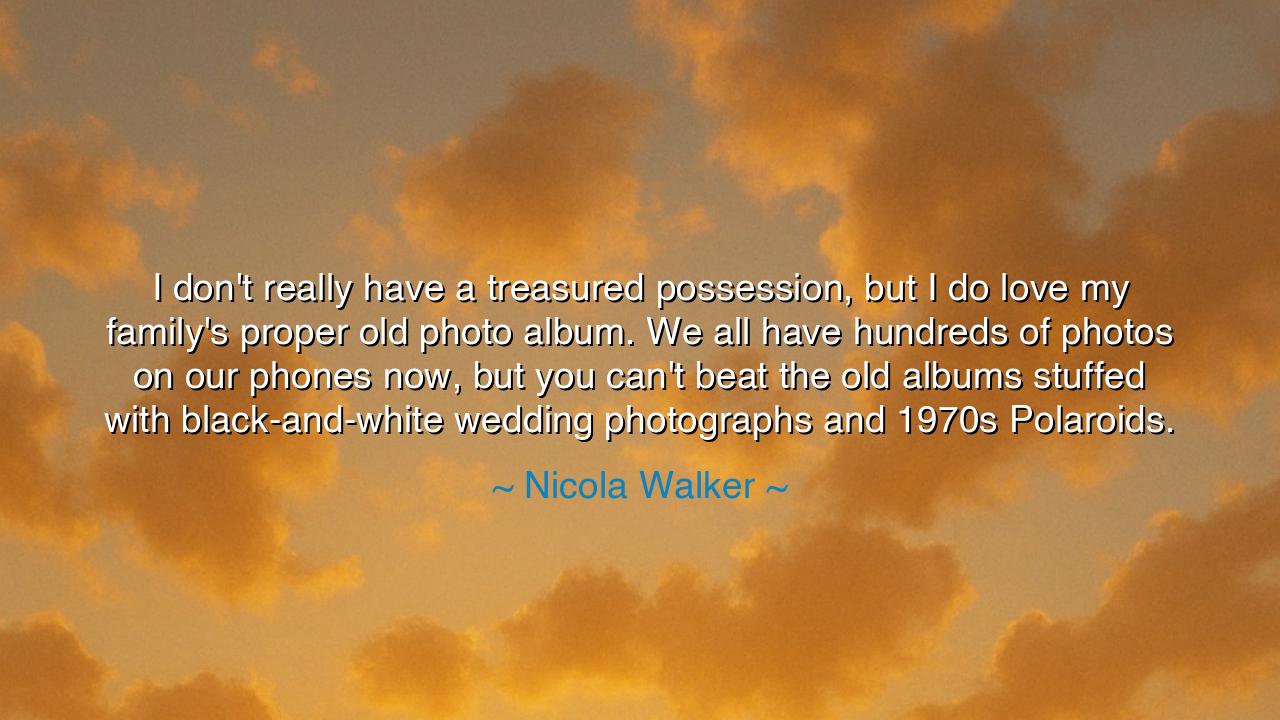
I don't really have a treasured possession, but I do love my
I don't really have a treasured possession, but I do love my family's proper old photo album. We all have hundreds of photos on our phones now, but you can't beat the old albums stuffed with black-and-white wedding photographs and 1970s Polaroids.






In the words of Nicola Walker, we hear the song of remembrance and the sacred weight of the tangible past. She declares that she does not cling to jewels or riches, yet her heart delights in her family’s old photo album. Unlike the endless images scattered across our phones, fleeting and weightless, these albums hold black-and-white wedding photographs and the warm, fading hues of 1970s Polaroids. They are not merely pictures but vessels of memory, pages heavy with love, history, and the presence of those who walked before us.
The ancients understood the sanctity of preservation. The Egyptians carved their lives upon stone walls, knowing that fleeting breath would vanish but the etched image might endure for millennia. So too do these albums serve as stone for our age—physical, enduring, not subject to the vanishing of signals or the corruption of screens. They are relics we may hold in our hands, where dust and scent carry as much memory as the images themselves.
In truth, the old albums are more than records; they are bridges. Within them, children may gaze upon the faces of ancestors on their wedding days, frozen in joy, standing at the threshold of new life. In those frozen smiles lies the reminder that we too are part of the same cycle, that the laughter of yesterday’s bride and groom flows into the love of today. To open such a book is to step into a lineage, to remember that we are not rootless, but branches of an eternal tree.
History gives us its reflection. When the Romans carried wax tablets inscribed with family names, they would gather them on feast days to remember their forebears. The tablets were not valuable in gold, yet they were priceless in meaning, for they held identity and continuity. In the same way, Walker’s treasured album is not adorned with wealth, yet it holds something richer: the faces and stories that shaped her being.
Therefore, let this truth be remembered: the treasures of life are not always rare gems or golden crowns, but memories preserved with love. In a world where images come and go like passing shadows, the album remains steadfast, a shrine of remembrance. To turn its pages is to touch eternity, to hear the laughter of ancestors, to feel the weight of legacy. And so, Walker’s words teach us that the true wealth of a family is found not in possessions, but in the stories and images that endure beyond time.






PHphuc huynhnhat
I love how Nicola Walker captures the magic of family photo albums. While we have an overwhelming amount of photos on our phones today, there’s something irreplaceable about going through a well-worn photo album. It’s like reconnecting with the past in a tactile way. What do you think—does looking at a physical photo make us feel more connected to our memories than swiping through a screen?
HOLe Hoang Oanh
Nicola Walker’s reflection on family photo albums really takes me back. The experience of flipping through old black-and-white photos or faded Polaroids is something I don’t think can be replaced by digital images. Do you think the way we store and share memories has changed too much with the rise of smartphones, or do you think we’ll always cherish physical photos for their nostalgic value?
GDGold D.dragon
What a beautiful sentiment from Nicola Walker! There’s something undeniably special about old photo albums, especially when they’re filled with memories of people and moments long gone. It makes me think—do you think that having physical photos makes those memories feel more lasting and real, as opposed to the transient nature of digital images that can sometimes feel less personal?
LNTran Luong Nguyen
I can completely relate to Nicola Walker’s love for family photo albums. There’s something about the tangibility of an old album that gives it a different kind of emotional weight. You can feel the history in the photos, and it’s not the same experience as seeing hundreds of images on a screen. Do you think that, in today’s digital age, people are losing the personal connection that comes with physical photos and albums?
Ttram
Nicola Walker’s comment about the charm of old photo albums really resonates with me. There's something special about holding a physical album, flipping through pages, and seeing memories captured in black-and-white or Polaroids. It’s so different from scrolling through digital photos on our phones. Do you think that physical photographs are more meaningful because of the effort involved in creating them, or is it just the nostalgia that makes them so special?